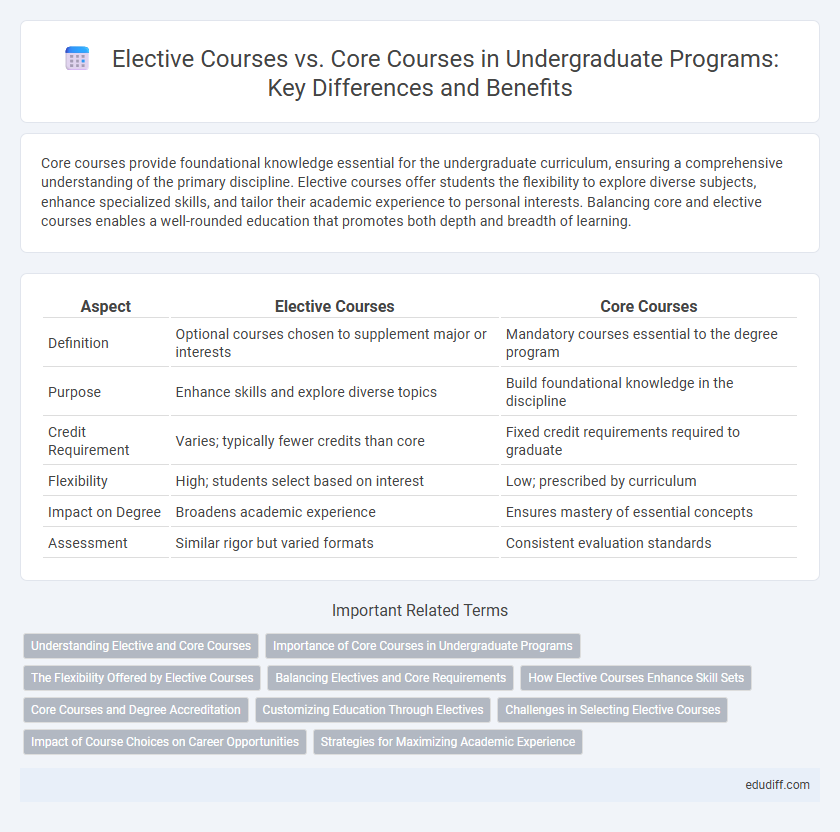Core courses provide foundational knowledge essential for the undergraduate curriculum, ensuring a comprehensive understanding of the primary discipline. Elective courses offer students the flexibility to explore diverse subjects, enhance specialized skills, and tailor their academic experience to personal interests. Balancing core and elective courses enables a well-rounded education that promotes both depth and breadth of learning.
Table of Comparison
| Aspect | Elective Courses | Core Courses |
|---|---|---|
| Definition | Optional courses chosen to supplement major or interests | Mandatory courses essential to the degree program |
| Purpose | Enhance skills and explore diverse topics | Build foundational knowledge in the discipline |
| Credit Requirement | Varies; typically fewer credits than core | Fixed credit requirements required to graduate |
| Flexibility | High; students select based on interest | Low; prescribed by curriculum |
| Impact on Degree | Broadens academic experience | Ensures mastery of essential concepts |
| Assessment | Similar rigor but varied formats | Consistent evaluation standards |
Understanding Elective and Core Courses
Elective courses offer undergraduate students the flexibility to explore interests outside their major, enhancing personal and academic growth by providing diverse knowledge and skills. Core courses establish the foundational concepts and essential competencies required within a specific field of study, ensuring a comprehensive understanding of the discipline. Understanding the distinction between elective and core courses allows students to strategically plan their academic path, balancing specialization with broader learning opportunities.
Importance of Core Courses in Undergraduate Programs
Core courses form the foundation of undergraduate programs by ensuring students gain essential knowledge and skills in their chosen field. These courses provide a structured curriculum that builds critical thinking, analytical abilities, and subject-specific expertise vital for academic and professional success. Mastery of core courses is crucial for meeting degree requirements and preparing students for advanced study or career opportunities.
The Flexibility Offered by Elective Courses
Elective courses provide undergraduate students with the flexibility to explore diverse subjects outside their core curriculum, allowing for personalized academic experiences tailored to individual interests and career goals. This flexibility enhances critical thinking and interdisciplinary skills by exposing students to varied perspectives and knowledge areas. Electives also enable students to adapt their learning paths in response to emerging fields and evolving industry demands.
Balancing Electives and Core Requirements
Balancing elective courses and core requirements is essential for undergraduate students aiming to develop both specialized knowledge and broad skill sets. Core courses provide foundational expertise critical for degree completion, while electives offer opportunities to explore diverse interests and enhance interdisciplinary skills. Strategic planning ensures a well-rounded academic portfolio that supports career goals and personal growth.
How Elective Courses Enhance Skill Sets
Elective courses provide undergraduate students with opportunities to develop specialized skills beyond the foundational knowledge gained in core courses, such as advanced communication, critical thinking, and technical expertise. These courses enable students to tailor their education to their career interests, fostering adaptability and interdisciplinary understanding. Engaging in elective study areas like digital marketing, coding, or foreign languages significantly boosts employability by expanding practical skill sets relevant to diverse professional fields.
Core Courses and Degree Accreditation
Core courses constitute the essential curriculum that defines an undergraduate degree's academic foundation, directly influencing degree accreditation standards. These courses are designed to ensure students acquire fundamental knowledge and skills required for their field, meeting institutional and accreditation body requirements. The successful completion of core courses is mandatory for degree conferral, reinforcing the program's credibility and recognition in professional and academic settings.
Customizing Education Through Electives
Elective courses offer undergraduates the flexibility to tailor their education by exploring subjects beyond their core curriculum, fostering interdisciplinary skills and personal interests. Core courses ensure foundational knowledge essential for a student's major, while electives enable customization that enhances critical thinking and career readiness. Emphasizing electives in degree programs supports diverse learning experiences and adaptability in evolving job markets.
Challenges in Selecting Elective Courses
Selecting elective courses poses challenges such as aligning personal interests with degree requirements while ensuring credits contribute effectively toward graduation. Students often struggle with limited information about course content, future relevance, or instructor quality, which complicates informed decision-making. Balancing workload and academic goals requires strategic planning, especially when electives vary in difficulty and scheduling conflicts arise.
Impact of Course Choices on Career Opportunities
Elective courses offer specialized skills and diverse knowledge that can differentiate undergraduate students in the job market, enhancing their adaptability to various career paths. Core courses provide foundational expertise essential for professional competence and are often prerequisites for advanced study or certification within specific industries. Strategic selection of both core and elective courses can optimize employability by aligning academic credentials with evolving employer demands and industry trends.
Strategies for Maximizing Academic Experience
Choosing a balanced mix of elective and core courses allows undergraduates to deepen subject expertise while exploring diverse interests. Prioritizing core courses ensures mastery of foundational knowledge required for graduation and future specialization. Integrating electives strategically can enhance interdisciplinary skills, foster critical thinking, and improve overall academic engagement.
Elective Courses vs Core Courses Infographic

 edudiff.com
edudiff.com